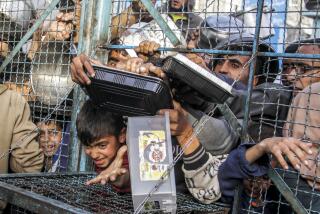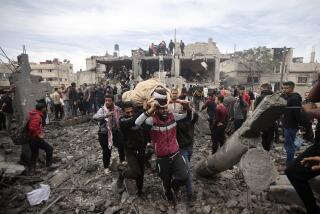U.N. Vanguard in Bihac Powerless to Aid Bosnia : Balkans: Poorly armed Bangladeshi troops trapped with few provisions. Enclave is vulnerable to Serbs.
- Share via
ZAGREB, Croatia — The world’s bulwark against the next foreseeable explosion of the Balkan conflict is a shivering battalion of Bangladeshis so poorly outfitted by the U.N. mission here that they share sleeping bags, shower in cold water and have only one gun for every four soldiers.
The 1,200 Bangladeshis meant to deter a Bosnian Serb nationalist rout of the Bihac pocket were deployed to the vulnerable enclave in the northwestern corner of Bosnia-Herzegovina before their supply ship arrived with the food, fuel, weapons and supplies for the winter, U.N. officials here and in Bihac disclosed Tuesday.
“They’ve been sent here completely unprepared. They don’t have anything--no heating, not enough fuel or food,” a U.N. source said by telephone from the embattled and isolated Bihac. “They are walking around even without winter coats, and it is already cold here.”
Bihac has suddenly emerged as the most unstable and potentially disastrous venue in the roiling Balkans in the two weeks since Bosnia’s Muslim-led government recaptured 100 square miles of territory from the better-armed, but thinly spread, Bosnian Serbs.
Angered by their first significant loss in 32 months of armed rebellion, Bosnian Serbs loyal to their leader, Radovan Karadzic, have mobilized fellow Serbian rebels in Croatia as well as a defeated force of renegade Muslims for a deadly counteroffensive that has grabbed back most of that territory.
Karadzic’s vow to roll on through Bihac and erase the Muslim enclave has trapped BangBat, as the subcontinental contingent is known in U.N. parlance, on a blazing battleground with neither the means to defend itself nor any hope of protecting the U.N.-designated safe area.
“We are gravely concerned about the situation with regard to the Bangladeshi battalion in Bihac,” U.N. mission spokesman Michael Williams told reporters after detailing ominous indications that Bihac could soon be the target of a massive siege.
Despite the menacing moves by Serbian gunmen who surround as many as 200,000 Bosnians in the Bihac pocket and the Bangladeshis sent to assist them, the U.N. mission finds itself powerless--at least for the moment--to call in air strikes and equally unable to rescue its own troops from their precarious position.
Unlike Sarajevo and Gorazde, two other U.N. safe areas purportedly protected by NATO jets enforcing bans against heavy weapons, Bihac has not been designated a weapons-exclusion zone, although policy-makers at the North Atlantic Treaty Organization proposed Tuesday that it be declared one.
If the zone is given formal approval, NATO could be called upon to attack heavy weapons within six miles of Bihac City. But even if Bihac were immediately designated a weapons-exclusion zone under NATO enforcement, it is doubtful the poorly equipped Bangladeshi peacekeepers could ensure that heavy weapons are withdrawn and the risk to the Bihac population abated.
And because Bihac is surrounded by Serb-occupied territory bristling with antiaircraft missiles and ruled by unpredictable rebel forces, Western countries that earlier parachuted relief supplies to similarly encircled eastern Bosnian enclaves have refused to make the dangerous flyovers to air-drop food and medicine to the people of Bihac or the Bangladeshis, Williams said.
The U.N. troops have been on canned rations for two weeks and will run out of food by Nov. 25. To stretch dwindling fuel supplies, only cold water is available in their barracks and they have no heat.
Another U.N. spokesman at mission headquarters here, Thant Myint-U, said the ship carrying supplies for the Bangladeshis arrived only Nov. 1, about two weeks after the troops were sent in to replace French soldiers. The French government withdrew its troops on short notice as part of a general drawdown that will cut the French contingent of 6,000 nearly in half by the end of the year.
Serbian rebels occupying areas of Croatia contiguous to the Bihac pocket have been blocking humanitarian aid to the predominantly Muslim region for five months and since late October have also refused to let U.N. resupply shipments pass through their territory.
The Croatian Serb rebels have likewise blocked foreign journalists from traveling to Bihac, preventing any firsthand assessment of the state of the U.N. deployment there.
But officials at the Zagreb headquarters concede that the troops from tropical Bangladesh arrived with little in the way of winter clothing in a mountainous region where nighttime temperatures are already below freezing.
Even what sleeping bags were provided to the Bihac-based troops came from what Williams described as “leftover East German stocks,” rejected as substandard for the all-German military after unification in 1990.
Of most serious concern, the U.N. officials said, is the dearth of weapons for the troops deployed along what is now the Balkans’ most active and dangerous front line. Fewer than 300 rifles were brought in by the contingent when it arrived a month ago. The rest of its personal weapons and heavier guns are now blocked by Serb rebels.
In a further sign of eroding U.N. influence in the simmering region, the Office of the U.N. High Commissioner for Refugees disclosed it has been compelled to reduce aid to more than 30,000 Muslims who fled the Bihac pocket in August after renegade Muslim warlord Fikret Abdic was defeated by the Bosnian army.
At least 5,000 fighting-age males lured to Abdic’s side with food and money from his black-market dealings have been conscripted from their makeshift refugee camps by Croatian Serb rebels to wage another assault on Bosnian army forces in Bihac.
U.N. sources here speculate that Abdic has joined forces with the Serbs in hopes of being reinstated as leader of a collaborating Muslim fiefdom.
“This violates a fundamental principle of international law. We vigorously protest this mobilization,” U.N. refugee spokesman Peter Kessler said of the Serbian recruitment of displaced people for military offensives.
He said the symbolic reduction in aid was intended as a warning to Abdic but that the refugee agency could not completely halt supplies to Abdic loyalists because of concern for noncombatant women and children.
In eastern Bosnia, Karadzic informed the U.N. mission his forces will continue to block all fuel supplies to peacekeepers in Gorazde, Srebrenica and Zepa.
The U.N. mission is reluctant to use force to push through supplies even for its own soldiers, Williams said, for fear that resorting to any aggression would provoke retaliation by the Serbs who have considerably more firepower than the peacekeeping forces, especially in the case of defenseless BangBat.
More to Read
Sign up for Essential California
The most important California stories and recommendations in your inbox every morning.
You may occasionally receive promotional content from the Los Angeles Times.














